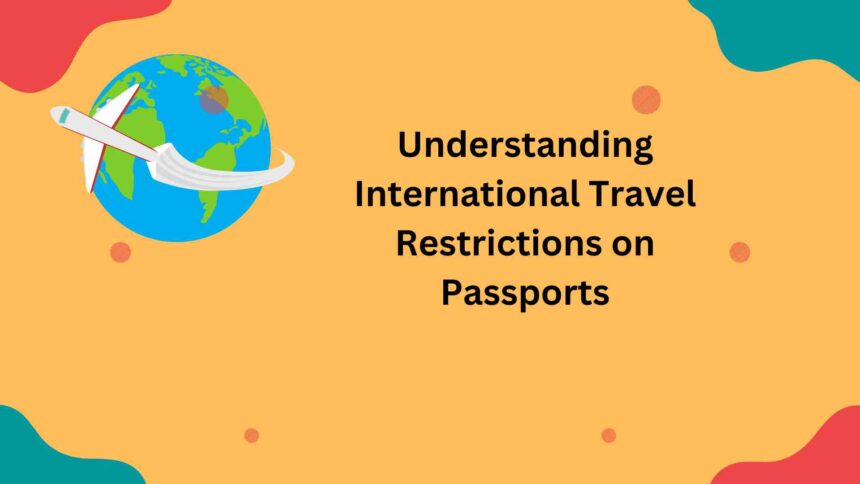Apply for Passport Online is the process by which an individual applies for or renews a passport, an official government-issued document that verifies one’s identity and nationality. A passport is essential for international travel, allowing a person to enter and leave foreign countries, and return to their home country. Traveling internationally offers opportunities for exploration, education, and cultural exchange. However, with the freedom to travel comes the responsibility to navigate a complex landscape of international travel restrictions on passports. These restrictions can stem from various factors, including geopolitical situations, health crises, and national security concerns. This article aims to clarify the nature of these restrictions, the reasons behind them, and how travelers can prepare to navigate the changing landscape of international travel.
The Basics of Travel Restrictions
Travel restrictions refer to laws or regulations that limit the ability of individuals to enter, exit, or transit through a country. These restrictions can take many forms, such as visa requirements, travel bans, and quarantine mandates. The regulations are often tied to the passport a traveler holds and can vary significantly based on the traveler’s nationality and the country of destination.
Types of Travel Restrictions
- Visa Requirements: Many countries require travelers to obtain a visa before entry. This can involve applying for a tourist, student, work, or transit visa, each with its own eligibility criteria, application process, and duration of stay.
- Travel Bans: Certain countries may impose travel bans on specific nationalities due to political or diplomatic tensions. Such bans can be temporary or indefinite, significantly affecting the ability of citizens from those nations to travel freely.
- Health Regulations: Recent global health crises, such as the COVID-19 pandemic, have led to the implementation of health-related travel restrictions. These may include requirements for vaccination, negative testing results, or quarantine upon arrival.
- Entry Restrictions: Some countries impose restrictions on the types of individuals allowed to enter. For instance, individuals with a criminal record or those suspected of having links to certain organizations may be denied entry.
- Document Validity Requirements: Many nations require travelers to have passports that are valid for a specific period beyond their intended stay—commonly six months. Failure to meet this requirement can result in denied boarding or entry.
Reasons for Travel Restrictions
1. National Security
National security is a primary reason behind many travel restrictions. Countries often impose regulations to protect their borders from threats, including terrorism, human trafficking, and illegal immigration. By controlling who can enter, governments aim to safeguard their citizens and maintain public safety.
2. Geopolitical Situations
Diplomatic relations between countries can also impact travel restrictions. When tensions arise—whether due to military conflicts, economic sanctions, or human rights violations—governments may respond with travel bans or heightened visa requirements. Such restrictions often target specific nationalities or individuals deemed a risk.
3. Health Concerns
Health crises, such as the COVID-19 pandemic, have led to unprecedented travel restrictions. Countries may enforce travel bans or quarantine requirements to prevent the spread of infectious diseases. Vaccination and testing requirements have become commonplace, with governments seeking to protect their populations.
4. Legal and Regulatory Compliance
Travel restrictions may also arise from legal requirements regarding visas, work permits, or residency permits. For example, some countries may require foreign students to secure a specific visa type before entering for study. Failure to comply with these regulations can lead to deportation or a ban on re-entry.
Navigating Travel Restrictions
Understanding and navigating travel restrictions requires diligent planning and research. Here are steps travelers can take to prepare for international journeys:
1. Research Entry Requirements
Before planning a trip, it’s essential to research the entry requirements for the destination country. This includes:
- Visa Requirements: Check if a visa is needed and the type required based on the purpose of travel.
- Passport Validity: Ensure that the passport is valid for at least six months beyond the intended stay.
- Health Regulations: Investigate any health-related entry requirements, such as vaccinations or testing protocols.
2. Stay Informed About Changes
Travel restrictions can change rapidly due to political developments or health situations. To stay informed:
- Follow Government Advisories: Monitor travel advisories from your government’s foreign affairs department or relevant embassy.
- Subscribe to Alerts: Many travel websites and airlines offer alerts on changes to travel regulations.
3. Consult Official Sources
Official government websites often provide the most accurate and up-to-date information regarding entry requirements. Resources like the International Air Transport Association (IATA) and the World Health Organization (WHO) can also offer valuable insights.
4. Prepare Necessary Documents
Gather all necessary documentation before traveling. This may include:
- Visa: Ensure that you have the correct visa type if required.
- Health Documentation: Carry proof of vaccinations and any negative test results.
- Travel Insurance: Consider purchasing travel insurance that covers health issues and cancellations related to travel restrictions.
5. Be Flexible
Given the unpredictability of travel regulations, flexibility is key. Consider:
- Flexible Booking Options: Choose airlines and accommodations that offer flexible cancellation and change policies.
- Alternate Travel Plans: Have backup plans in case you need to change your travel dates or destinations due to unexpected restrictions.
Challenges Faced by Travelers
Travelers often encounter challenges due to the complex nature of international travel restrictions:
1. Misinformation
With the abundance of information available online, misinformation can spread easily. It’s crucial to verify details through official channels rather than relying solely on social media or anecdotal sources.
2. Complexity of Regulations
Understanding the nuances of travel regulations can be overwhelming. The requirements can vary widely from one country to another, and even different states within a country may have their regulations.
3. Travel Disruptions
Unexpected changes in travel restrictions can lead to disruptions. Travelers may find themselves in situations where flights are canceled, or they are denied entry upon arrival, leading to frustration and unexpected costs.
Note: You can also Apply for Tatkal Passport
Conclusion
International travel restrictions on passports can be complex and varied, shaped by factors like national security, health concerns, and geopolitical relations. As travel resumes globally, understanding these regulations is more crucial than ever for ensuring safe and enjoyable journeys.
By staying informed, preparing necessary documentation, and being flexible in travel plans, travelers can navigate the intricacies of international travel restrictions with greater confidence. Ultimately, a well-informed traveler is better equipped to embrace the enriching experiences that come with exploring the world.







